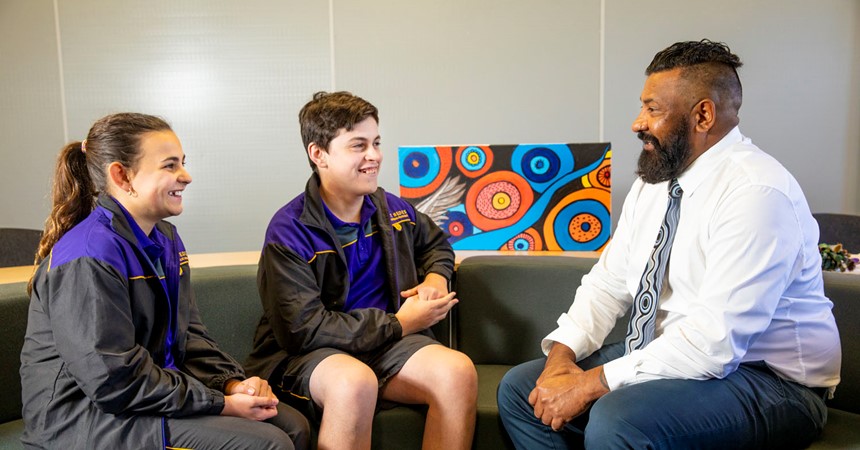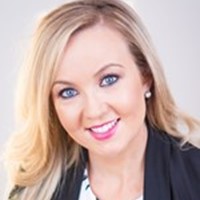Growing up in Moree in the 1970s wasn't always easy for Mr Duncan. He was one of four siblings raised by a single mother and attended Moree Public School. There, he took part in classes delivered by an all- white staff, which he recalls often left him quite confused.
"Lessons taught at school were quite contradictory to what I learnt at home, particularly around the topic of Australian history," says Mr Duncan. He now has a passion for comprehensive education, ignited as a Year 10 student when he returned to Moree Public School to undertake work experience.
Years later, while studying a Bachelor of Education, Mr Duncan worked in a public sector role aimed at facilitating employment opportunities. This experience strengthened his resolve to improve educational outcomes for all students.
"An education that encompasses a variety of views and modalities of learning is so important, not just for Aboriginal and Torres Strait Islander students, but everyone,” says Mr Duncan. “It leads to better employment outcomes, social outcomes and health outcomes. It’s the basis of a strong society."
Mr Duncan has been working in the education sector for more than 20 years. He took up an education officer role with the Diocese's Schools' Office earlier this year and, in collaboration with staff and students, delivers focused educational programs across its network of schools.
"Schools today are very different to what they were when I was a student 40 years ago," says Mr Duncan. There is a sense of optimism in his voice.
"When I attended school, there were no openly Indigenous educators on staff,” he says. “For a lot of my peers that would have been enough for them to think that a career as a teacher wouldn't have been possible, but thankfully my mum showed me that with enough hard work and determination you could achieve whatever you put your mind to."
He is buoyed by the Diocese's decision to renew its commitment to employing more Aboriginal and Torres Strait Islander staff.
"It's important for a couple of reasons,” he says. “Representation of a greater number of cultures from which students can learn, and with which they identify, and tangible demonstration of people from minority groups taking on leadership roles in our community, create positive role models."
Diverse staff, Acknowledgement of Country, the presence of Aboriginal artworks and increasingly the use of Indigenous language
are all benchmarks Mr Duncan can readily recall as being critical indicators of the change that has occurred in schools in recent years.
The Australian Curriculum, Assessment and Reporting Authority (ACARA) acknowledges the current gap in learning outcomes between Aboriginal and Torres Strait Islander students and their non-Indigenous peers and is committed to using every opportunity possible to “close the gap”.
Mr Duncan is supportive of ACARA's plans to address Aboriginal and Torres Strait Islander students' ability to see their cultures reflected in the curriculum, and endorses the Histories and Cultures cross- curriculum prioritised for all students.
"A cross-curriculum empowers all students to learn empathy, break down stereotypes, celebrate diversity and move towards reconciliation,” Mr Duncan says. It also helps debunk myths and broaden students' perception of what's possible.
"I think there was a perception, created years ago during colonisation, that Aboriginal and Torres Strait Islander people are primitive,” he says. “This is simply not the case. We just had a different way of living that suited our environment and it was at odds with European values.
"For instance, we weren't nomads. We were agriculturalists. We knew how to create a sustainable lifestyle, which enabled us to thrive in the harsh Australian climate and be the world's oldest continuous living culture."
His comments about the Aboriginal and Torres Strait Islander connection to the land are timely, with experts in Indigenous fire management assisting the Royal Commission into National Natural Disaster Arrangements.
"I'm glad the government and lead organisations, including universities, are now seeking to incorporate an Aboriginal perspective on a vast number of issues," Mr Duncan says.
"It's not a matter of our way being right, and practices introduced through colonisation being wrong. It’s about having a conversation and sharing our knowledge. Providing all Australians with the opportunity to learn about Aboriginal history and culture will aid reconciliation efforts, enable us to grow as a nation and build on thousands of years of wisdom. Today's generation of students is learning this from the get-go, which gives me great confidence."























































































